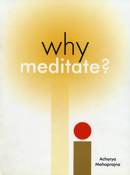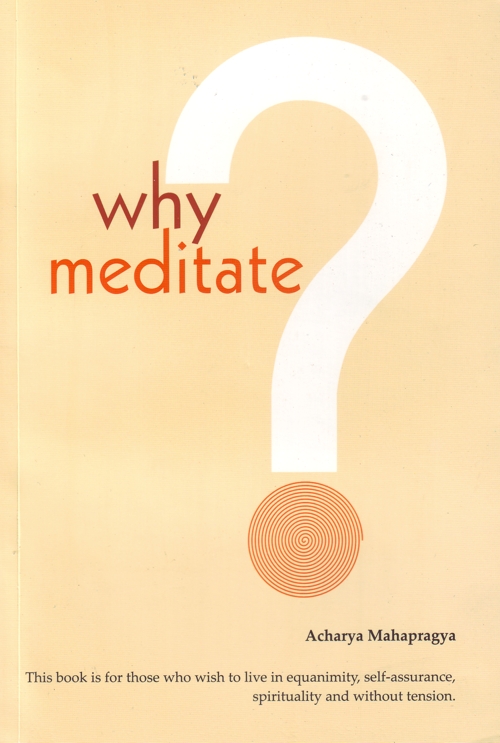
 The question presented to us today is: "What is mental health?" It is important to pay attention to mental health. Let us start our consideration with thought. If our thoughts are positive, then the mind will benefit us. And if the thoughts are not positive, then the mind will create problems. Anugraha (to oblige or to benefit) & Upghat (to create problems) are oft-used terms from the Jain Aagamas and we may consider them as the two dimensions of the mind. When a person indulges in negative thinking, he takes in inauspicious particles pudgal which produce disease and suffering in the body. Acharya Malayagiri, in the commentary of Nandisutra, has clearly described that acceptance of inauspicious particles leads to heart diseases. Unhealthy thoughts and improper use of the imagination leads to acceptance of inauspicious particles. These particles cause harm to the heart. More and more people are suffering from heart problems, and this is increasing day by day, creating a global malady. While diagnosing the cause of heart disease, treatment should not be limited to blood pressure and food habits alone. Negative thoughts are also a major cause of heart disease.
The question presented to us today is: "What is mental health?" It is important to pay attention to mental health. Let us start our consideration with thought. If our thoughts are positive, then the mind will benefit us. And if the thoughts are not positive, then the mind will create problems. Anugraha (to oblige or to benefit) & Upghat (to create problems) are oft-used terms from the Jain Aagamas and we may consider them as the two dimensions of the mind. When a person indulges in negative thinking, he takes in inauspicious particles pudgal which produce disease and suffering in the body. Acharya Malayagiri, in the commentary of Nandisutra, has clearly described that acceptance of inauspicious particles leads to heart diseases. Unhealthy thoughts and improper use of the imagination leads to acceptance of inauspicious particles. These particles cause harm to the heart. More and more people are suffering from heart problems, and this is increasing day by day, creating a global malady. While diagnosing the cause of heart disease, treatment should not be limited to blood pressure and food habits alone. Negative thoughts are also a major cause of heart disease.
The second dimension of the mind is Anugraha. If our thoughts are creative, the mind will accept auspicious particles, which help us to cure our ailments. This benefits us and we can solve many of our problems.
In the context of mental problems that are linked to health, the principle of self-restraint is very useful. Acharya Tulsi launched the Anuvrat Movement. Its slogan is 'Sanyamah Khalu Jeevanam' - self restraint is life. If we understand this principle well, many problems of our life will be resolved.
Smriti (memory) is our power. It helps us to execute a lot of work. One who doesn't know to restrain his memory has to suffer from mental illness. Even memory requires restraint. Take, for example: you are meditating and your past appears in front of you, your meditation will be disturbed. The cycle of memory is such that it entangles a person in the mesh of disease. Recalling unnecessary events is a major cause of sickness. It is better to use your memory only as much as necessary. Do not recall unnecessary events and thoughts, because unnecessary memories create problems.
An old lady used to spin yarn. On one occasion, she went to the seashore. She saw a ship docked there. Thereupon, she asked: "What is loaded in this ship?" The navigator replied: "Imported bags of cotton yarn." On hearing this, her mind was riveted to the thought: "Who will spin so much yarn?" As she kept on and on thinking about spinning the huge bales of cotton on the ship, this very thought made her go mad. She was taken to the psychiatrist. He was clever enough to understand the complete story. He asked that lady, "Oh mother, what's the matter?" The old lady said, "Who'll spin so much cotton?" The psychiatrist told, "Don't you know that cotton has burnt?" As soon as she heard these words, the lady was instantly cured.
Uncontrolled memory and over-imagination also result in mental illness. Imagination, too, should be within limits. If there is no control over one's imagination, it can create big problems. If we think deeply, we will realise that imagination has played an important role in causing wars and quarrels. Imagination may lead to mental illness as well as quarrels.
A man said to another, "Brother! I wish to buy a buffalo."
The other asked, "Where will she graze?"
"In your field," came the answer.
"If she comes into my farm I'll hit her hard and driver her out!"
"I'll see how you'll touch her!"
There was neither any buffalo nor a farm there, but imagination created such circumstances that they started fighting and people gathered around them. God alone knows how much destruction imagination wakes.
When a practitioner of meditation complains that the mind does not stay fixed at one point, that there is no concentration, where is the obstacle actually? What obstructs stability? It is uncontrolled memory. At that time, even though there is no need to recall our past memories, the entire past flashes across our minds like a mirror image. Another obstruction is imagination. Both uncontrolled memory and over-imagination lead to mental illness.
The third function of the mind is to think. Thinking, too, should also be done within limits. It is not necessary to keep on thinking all through the day. Man should learn to remain empty, free from thought. Remaining empty is an art. It is an art of meditation and an art of spiritual practice Sadhana.
Once, a mendicant came to a shop. The shopkeeper told him: "I sell a lot of products."
The mendicant enquired: "Where are they? Show them to me."
The shopkeeper began to point them out: "This is butter".
"This is oil."
"These are spices."
Then came an empty barrel.
The mendicant asked, "What is in this barrel?"
The shopkeeper answered, "God."
The mendicant told him, "Do remember this fact that only if it is empty will God enter and that which is not empty is filled with garbage."
Remaining thoughtless is a great art. A very good technique of keeping the mind thoughtless is restraining (controlling) our breath. While holding the breath, the mind is relieved from thought, imagination and memory. That is why the holding of one's breath has a very important place in the field of Sadhana (spiritual practice). The person who can control and hold his breath can make good progress in the field of spiritual practice. Until the cycle of memory, thought and imagination continues in our mind, we cannot move ahead towards the inner world, i.e., the world beyond the senses. We cannot even awaken our subtle powers. If the gross elements like memory, thought and imagination do not exist, then the subtle powers would get a chance to come out.
One man is wise while the other is crazy. What is the difference between the two? If we think in accordance with philosophy, the person who has control over his thoughts and can stop the compulsive flow of thoughts is wise, while he who clings to his thoughts and cannot stop them is crazy.
Let us try to understand the meaning of self-restraint. We have to practice self-restraint along with the activities and potential powers of the mind. No excessive thinking, no over-imagination and no unnecessary memories. We have to control all three.
Mind performs a dual responsibility. It undertakes the responsibility of the inner world of emotions as well as that of outer circumstances. It is the mind, which is affected by outer circumstances as well as the inner flow of feelings and emotions. Poor mind! It has to carry the load of both the inner and the outer world. Whenever the Mohaniya Karma is activated, the mind gets perplexed.
 Acharya Mahaprajna
Acharya Mahaprajna
 Copyright by Acharya Mahaprajna ©2005
Copyright by Acharya Mahaprajna ©2005